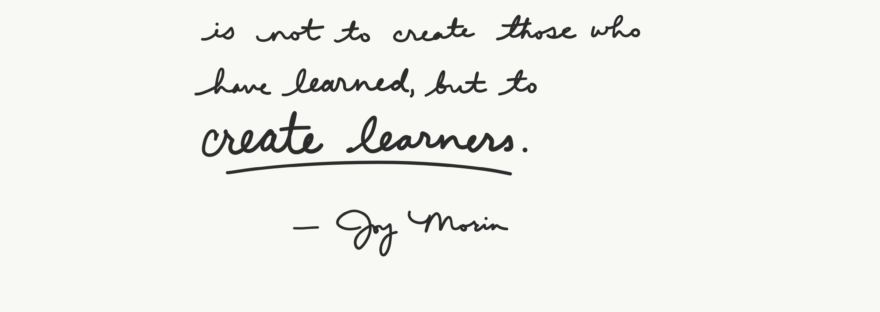
I remember my band instructor from high school as the type of teacher who is always working to improve their craft. It wasn’t unusual during any given rehearsal for him to introduce and implement a new teaching idea or learning activity he had picked up, whether from a book or colleague at a music educator’s conference.
He was a wonderful role model for us students. Even as a high schooler, I admired his choice to consider himself ever on a journey towards self-improvement as a teacher.
As a music educator myself today, I am on that same journey. I want to be — and am — the kind of teacher who is always learning, always trying something new, and always improving.
No matter how new or already-experienced I am at something, I prefer to take this approach of striving for self-improvement. As my pastor sometimes says: “It’s fine to be where you are. It’s not fine to stay there.”
Learning involves experimentation and “it might not work.” There might be failures or less-than-successes. Mistakes.
Learning also involves possibility. The possibility of being able to do something you couldn’t do before. The possibility of insight, new skill, more ease.

Even though it’s a messy process and doesn’t (normally) go in a straight line, I personally choose to find learning enjoyable. No matter the topic area, I’m interested in opportunities to learn new things — although at times I must make choices about what I have or don’t have time to devote energy toward.
I know I’m not unique in this regard. When I talk to other teachers, I often observe a similar mental posture. A positive energy towards new ideas. An openness to change and the possibility of being wrong.
We teachers tend to be learners.
This, most likely, is why we are teachers: we love the learning process.
My thought for the day is this:
Do we consciously model for our students what it means to be an eager learner? How openly can we demonstrate being the sort of learner we want each of our students to be? How can we display our open attitude towards change and improvement, as my high school band instructor did?
After all, such is the purpose of a teacher:
The ultimate goal of the teacher is not to create those who have learned, but to create learners.

• • •
Call to Action:
Leave a comment: How can YOU openly model for your students how to be a learner? And what new things are you currently learning in your endeavors?



Great post! Thank you, Joy!
Thanks for reading, Jane!
I agree I think that we do like learning. However, trying something new can be a bit of a worry, but most times our pupils enjoy a change in the usual 30 mins pattern of a lesson. Recently I have taken the plunge and
am encouraging my pupils to compose…anything from 4 bars to whatever! It was never part of my lessons as a student, so I felt somewhat wobbly at first, but the enthusiasm and enjoyment from the pupils that have given it a try is fantastic.
I love this! That sounds wonderful, Margaret. Yes, learning is wobbly and messy, but as you say, kids are used to this! We can learn from our students and their wonderful enthusiasm for new experiences.
That is very true, everyday is an experience as a teacher, we learn a lot of things for our students with different attitudes, skills and techniques. As a piano teacher it easy for us to assess if the student will come a great pianist base on what we have learn and experience from students that meet their success…
On a regular basis, I’ll start a lesson by inviting a student to listen to a piece of music I’m learning. “Would you mind listening to this? It’s a piece I’m new to, and I’d love your opinion.” And not fake it, but actually present a short passage of music “in the rough” and get their feedback. I find it draws me into a place where they see me as vulnerable and a learner, just like them. Sketchy at first, but fun!
Norm – This is excellent example of how we can model for our students being learners. Thanks for sharing!
Wonderful instruction… I have 2 kids and both are expressing an interest in a piano. I will try this. Thanks.